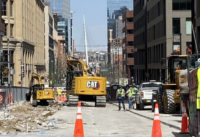Nearly two years after issuing a request for qualifications, Denver has selected PCL Construction Services as the preferred design-build contractor to refurbish the city’s 16th Street Mall.
The action means that work on the 1.2-mile-long pedestrian and transit corridor may finally begin this year, after years of studies, planning and design. Final negotiations need to be completed before the design-build contract is presented to the Denver City Council for approval, according to Nancy Kuhn, a spokesperson with the Dept. of Transportation & Infrastructure (DOTI).
“We’ll be taking the contract proposal and an intergovernmental agreement (IGA) to receive money from the Colorado Department of Transportation for this project to a city council committee on February 23,” Kuhn says. “If the committee votes to move the contract and IGA forward, they would both likely go before the full council for passage in March.”
She adds: “If a design-build contract is approved by city council in the coming weeks, we would anticipate final design to get underway in the late April or early May timeframe and construction to begin sometime in Q4 of 2021.”
The PCL team will complete the design, which already is 15% to 30% finished. Kuhn said DOTI will ensure there is a contingency fund to deal with any unforeseen conditions that arise during construction.
The most recent project cost estimates range from $90 million to $130 million and possibly up to $150 million, as first reported by The Denver Post. The city is leading the project with input from the Regional Transportation District (RTD) and the Downtown Denver Partnership.
Long Time Comin’
The mall upgrades have long been desired by RTD. The transit agency says maintenance on the mall and its iconic red-and-gray granite pavers—a key feature of the original design for the mall, done by the late Henry Cobb of I.M. Pei & Partners and landscape architect Laurie Olin—costs about $1 million a year.
The nearly 400,000 pavers are a distinguishing feature of the mall design, evoking images of the Southwest through repeating patterns that resemble a diamondback rattlesnake or a Navajo rug. But the pavers, which cover not only the mall’s pedestrian areas but also its bus lanes, break easily under the weight of the shuttle buses, requiring maintenance an average of 75 days a year, RTD says.
The city says new granite pavers will be installed “in a pattern that’s similar to what’s on the mall now,” on top of the drainage and infrastructure improvements that will take place beneath the surface of the mall. The extent of those infrastructure upgrades is not yet known.
RTD says the original design of the nearly 40-year-old mall will be preserved as much as possible by the design-build contractor. The 2019 plan, which was used to obtain environmental and funding approvals, includes elements that honor the original design.
Those elements “were determined in consultation with the state historic preservation officer and other consulting parties who are advocates for cultural and historic resources,” says Susan Wood, RTD's environmental planning manager. “Adherence to these design elements is required by the Finding of No Significant Impact, and also in the Programmatic Agreement entered into by the SHPO and Federal Transit Authority,” Wood adds.
The surface elements include new pavers installed to mimic the current pattern, the use of refurbished lights that are replicas of those used in the original construction, as well as replacement of street trees in a variety of species that have similar characteristics to the original trees.
The investment in the mall will be well worth the price, the city says, since it will resolve critical safety and infrastructure deficiencies by improving the drainage system, including replacement of a water line dating from the 1880s, and add more surface friction on the walkways to improve pedestrian safety.
The project also calls for removing the existing median and shifting the paths of the two bus lanes to create 10 ft of dedicated, unobstructed sidewalk space on each side of the mall, thus allowing more space for pedestrians, amenities and events.
The city says it anticipates the project will play a key role in Denver’s post-pandemic economic recovery and could add $3.7 billion to the gross regional product, a regional version of the national gross domestic product, or GDP.
Consultants on PCL Construction’s design-build team include Martin/Martin Consulting Engineers, SEH Inc., Dig Studio and CIG.



